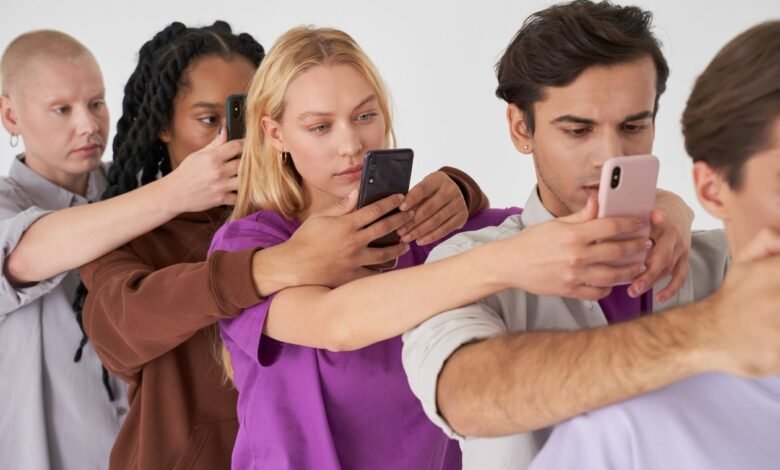The Impact of Smartphones on Society

In the 21st century, smartphones have become more than just communication devices; they have evolved into indispensable companions that have reshaped how we live, work, and interact with the world around us. The impact of smartphones on society is undeniable, as these pocket-sized marvels have triggered a digital transformation that touches nearly every aspect of our daily lives.
Impact of Smartphones on Society
Smartphone Influence on Culture: The ubiquitous presence of smartphones has led to a cultural shift that has transcended geographical boundaries. These devices have revolutionized communication, sharing information, and accessing services. With the power of a smartphone, individuals now have instant access to a world of knowledge, entertainment, and connectivity.
It’s no longer just a means to make calls; it’s a gateway to social media, e-commerce, and an ever-expanding universe of apps and services. In this article, we will explore the multifaceted impact of smartphones on society, examining how they have transformed our communication, behavior, and the fabric of our daily routines.
Communication Revolution
Impact of Smartphones on Society: One of the most significant impacts of smartphones on society is the revolution in communication. Smartphones have made it possible for people to connect like never before. Features such as text messaging, voice calls, video calls, and social media applications have made communication instant, convenient, and global.
Instant Messaging: Messaging apps like WhatsApp, Facebook Messenger, and iMessage have revolutionized how we chat with friends and family. With these apps, you can instantly send text, photos, videos, and even voice messages, regardless of geographical distance.
Social Media: Smartphones have fueled the rise of social media platforms like Facebook, Instagram, Twitter, and TikTok. These platforms enable users to share their lives, thoughts, and experiences, leading to new social interaction and expression forms.
Video Calls: Apps like Zoom and Skype have become essential tools for business meetings, education, and staying connected with loved ones, particularly during the COVID-19 pandemic. Video calls have bridged geographical gaps and allowed for face-to-face interactions.
Read More: Latest and Reliable Smartphones in 2023
Information Access

Impact of Smartphones on Society: Smartphones have transformed how we access information. The internet is now at our fingertips, providing instant access to knowledge and resources.
- Browsing: Mobile web browsing allows users to search for information, news, and entertainment. This has democratized access to knowledge, making it easier for people to stay informed.
- Educational Apps: Smartphones have become valuable tools for learning. Educational apps and platforms offer a wide range of courses, tutorials, and resources, making education more accessible to people of all ages and backgrounds.
- News and Media Consumption: Smartphone apps for news and media outlets enable users to stay updated with current events. However, the rise of social media has also raised concerns about the spread of misinformation.
Productivity and Work
Impact of Smartphones on Society: Smartphones have profoundly impacted productivity and work, changing how we approach tasks and employment.
- Remote Work: The COVID-19 pandemic accelerated the adoption of remote work, with smartphones playing a crucial role in this transition. They allow employees to stay connected, attend virtual meetings, and access work-related apps and emails from anywhere.
- Productivity Apps: The availability of productivity apps like Microsoft Office, Google Workspace, and project management tools has made it easier for individuals and teams to collaborate and manage tasks.
- E-commerce: Smartphones have revolutionized the way we shop. E-commerce apps like Amazon, eBay, and Alibaba have made browsing, purchasing, and receiving products convenient with just a few taps.
Entertainment and Leisure

Impact of Smartphones on Society: Smartphones have become indispensable entertainment devices, offering various options for leisure and relaxation.
- Streaming Services: Platforms like Netflix, YouTube, Spotify, and Apple Music provide access to movies, TV shows, music, and podcasts on demand. This has led to changes in media consumption, with binge-watching becoming a common phenomenon.
- Gaming: Mobile gaming has grown into a multi-billion-dollar industry. Casual games and more complex titles are readily available on smartphones, appealing to a diverse audience of gamers.
- Camera and Photography: Smartphone cameras have become increasingly sophisticated, allowing users to capture high-quality photos and videos. Social media platforms have popularized photo sharing and photo-based communication.
Health and Well-being
Impact of Smartphones on Society: While smartphones offer numerous benefits, they have also raised concerns about their impact on mental and physical health.
- Screen Time and Addiction: Excessive screen time, especially among young people, has raised concerns about smartphone addiction and its potential negative effects on mental health, including anxiety and depression.
- Sleep Disruption: Smartphones before bedtime can disrupt sleep patterns due to the blue light emitted by screens. Sleep deprivation is linked to various health issues.
- Physical Health: Prolonged use of smartphones can lead to physical health problems, such as “text neck” (strain on the neck and upper back), eye strain, and sedentary behavior.
Privacy and Security
Impact of Smartphones on Society: Smartphones have introduced new challenges related to privacy and security.
- Data Privacy: Smartphone apps often collect user data, raising concerns about how that data is used and protected. Incidents of data breaches and privacy violations have underscored the need for robust data protection measures.
- Cybersecurity: The increasing reliance on smartphones for personal and financial transactions has made them attractive targets for cybercriminals. Users need to be vigilant about cybersecurity threats like phishing and malware.
- Surveillance: The capabilities of modern smartphones have also raised concerns about government surveillance and the potential for misuse of surveillance technology.
Environmental Impact
The production and disposal of smartphones have significant environmental consequences.
- E-waste: The disposal of old smartphones contributes to electronic waste (e-waste) and environmental pollution. Proper recycling and disposal of electronic devices are essential to mitigate this impact.
- Resource Extraction: The production of smartphones requires the extraction of rare earth minerals and metals, which can lead to environmental degradation and human rights abuses in mining regions.
- Energy Consumption: Smartphones and data centers consume substantial energy, contributing to carbon emissions. Energy-efficient design and renewable energy sources are crucial to reduce this impact.
Read More: How to Extend Your Smartphone’s Battery Life: Practical Tips
Conclusion
Smartphones have undeniably transformed society profoundly, revolutionizing communication, information access, work, entertainment, health, and privacy. While they offer numerous benefits and conveniences, they also raise important challenges and concerns, ranging from mental health issues and privacy violations to environmental impacts.
As smartphones evolve, individuals, policymakers, and technology companies must address these challenges responsibly. Striking a balance between harnessing the potential of smartphones for societal advancement while mitigating their negative consequences is crucial for the continued evolution of our interconnected world.
FAQS: Impact of Smartphones on Society
1. How have smartphones changed the way we communicate?
Smartphones have revolutionized communication by offering instant messaging, video calls, and social media, making it faster and more convenient. People can now easily connect with others across the globe.
2. How have smartphones affected work and productivity?
Smartphones have facilitated remote work, allowing employees to stay connected and productive from anywhere. They also offer access to productivity apps, making task management and collaboration more efficient.
3. Are smartphones beneficial for education?
Yes, smartphones have become valuable educational tools. Educational apps and online courses make learning more accessible, and smartphones can provide quick access to research and study materials.
4. What are the health concerns associated with smartphone use?
Excessive smartphone use can lead to addiction, sleep disruption, and physical health problems. Using smartphones in moderation and being mindful of screen time is essential.
5. How do smartphones impact mental health?
There are concerns that excessive smartphone use, particularly on social media, can contribute to anxiety, depression, and social isolation. However, they can also offer mental health resources and support.
6. What are the privacy and security risks with smartphones?
Smartphones can pose privacy risks due to data collection by apps. They are also susceptible to cybersecurity threats like hacking and phishing. Users should be cautious about sharing personal information.











